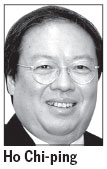HK could be a hub for promoting TCM's development
Updated: 2012-09-12 06:12
By Ho Chi-Ping(HK Edition)
|
|||||||
Traditional Chinese medicine (TCM), despite 5,000 years of history and its connection to ancient Chinese philosophy on man's relationship with nature, has been an official part of Hong Kong's health care system only since 1997. After the handover, with the legal status of TCM affirmed under Article 138 of the Basic Law, its practice was given official blessing by the SAR government and its practitioners were permitted openly to serve the society.
Measures were then taken to promote the practice of TCM. Three schools of Chinese medicine were established in local universities, including the University of Hong Kong (perhaps better known for its school of Western medicine). The comprehensive Chinese Medical Ordinance was enacted as a professional standard and the Chinese Medical Council was established to regulate practitioners.
The idea to promote Hong Kong as a center for traditional medicine was shared by all three Chief Executives of the HKSAR government, but more efforts are needed to take this to fruition. All the measures taken so far mark only the beginning of the story. Former chief executive Donald Tsang may have called traditional medicine "one of the six emerging pillar industries of Hong Kong", but difficulties lie ahead. One was market share and competitiveness: local brands like "Waiyuentang" and "Pochapills" may have established good reputations in Southeast Asia, but Japanese and Korean firms have 90 percent market share in the global market.

Public and private spending on research and development on TCM would need to be substantially increased if Hong Kong were to be taken seriously as a traditional medicine center. The underpayment of TCM graduates, as compared to Western medical practitioners, would need to be addressed. It is also odd that the future development of traditional medicine may be hindered by a management system controlled by doctors trained in Western medicine, or individuals involved with Western medicine, and who may not have a deep enough understanding of TCM.
In short, traditional medicine represents an unrealized opportunity. It has the potential, but without some changes, it will remain underutilized. In my view, several aspects of Hong Kong that could spur the development of traditional medicine were largely neglected. The most important is the city's acclaimed testing and certification industry, which could have helped standardize Chinese medicine.
Traditional medicine is undergoing a "modernization" process, as the bitter brews are replaced with highly refined pills. Ancient theories in traditional medicine such as "the five elements" and "yin-tang" are being supplemented by Western evidence-based research methods. The process of scientific testing is being increasingly incorporated into the development of traditional medicine, particularly in relation to its safety standards. Hong Kong's clear advantage in testing and certification would no doubt elevate traditional medicine to a higher status of respect and popular acceptance.
Through Hong Kong's well-regulated testing process, the mainland's production of raw herbs can improve its reputation amongst foreign consumers. "Made in China," especially when dealing with food and medicine, carries a stigma; Hong Kong, by regulating the entire process, can help reduce some of that stigma. Local production of Chinese medicine in Hong Kong can also benefit from the ease of access to herbs grown in the mainland. More importantly, Hong Kong's connectivity and marketing services can be integrated into a cohesive whole to promote TCM worldwide.
There are still many difficulties. Public acceptance of TCM is still relatively low, compared to Western medicine which remains the primary approach to treatment in government hospitals and private clinics. With several poisoning cases resulting from the ingestion of counterfeit medicine produced in China and the unresolved academic debate over the efficacy of traditional medicine, the promotion of TCM looks like an arduous journey.
However, with more and more evidence showing the limits of Western medicine when it comes to diagnosing and treating illnesses, Chinese medicine's emphasis on restoring the body's balance seems more credible. And, as the traditional medicine industry continues to modernize, more consumers will be drawn to its benefits. Hong Kong can be well-placed not only to take advantage of this trend, but even to accelerate it.
In the same way that the Western philosophy of the "free market economy" has successfully transformed Hong Kong from a fishing village to a global trading hub, traditional Chinese wisdom in medicine could lead Hong Kong through another transformation that would contribute to the health care and medical treatment of all humanity.
The author is former secretary for home affairs of the HKSAR government.
(HK Edition 09/12/2012 page4)